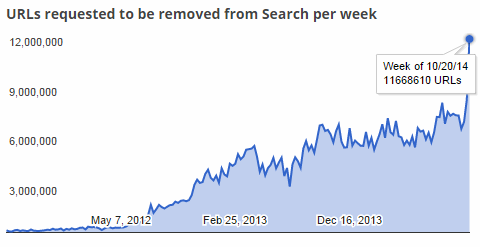Torrentfreak: “UK Museums and Libraries Protest Outdated Copyright Laws” plus 4 more |
- UK Museums and Libraries Protest Outdated Copyright Laws
- BitShare Hits Back at Police ‘Kinox’ Allegations
- Top 10 Most Pirated Movies of The Week – 11/03/14
- Copyright Monopoly Enforcement Gets To Trump Human Rights, Yet Again
- Google Takedown Requests Surge After New Anti-Piracy Measures
| UK Museums and Libraries Protest Outdated Copyright Laws Posted: 03 Nov 2014 05:19 AM PST
As per the Copyright, Designs and Patents Act (CDPA) 1988, unpublished works from authors who died before 1969 are protected until 2039, regardless of the age of the work. This is unlike other countries in Europe where institutions are allowed to use such important historical material freely and lawfully. The fact that very old unpublished works from authors who died long ago are still in copyright and will remain so till 2039 is especially frustrating to libraries and museums who want to display essential historical documents. To address this issue, the Chartered Institute of Library & Information Professionals (CLIP) has launched a campaign to free the country's history from the clutches of what they are calling as "outdated" and "inconsistent" copyright laws. The campaign, which is being supported by several leading museums, libraries, and cultural organisations including Imperial War Museums, National Library of Scotland, Collections Trust, aims to push the UK government to reduce the current copyright term. "The copyright laws mean we're not presenting a true representation of our cultural heritage,” says Naomi Korn, IP consultant at the Chair, Libraries and Archives Copyright Alliance. "Cultural heritage organizations either have to be willing to incur the risks or the costs of presenting the copyrighted works. That's the choice to make it available. That's wrong.” As part of the effort, CLIP is asking libraries, museums, archives, as well as cultural institutions to display a blank case in which they would like to show an unpublished document, but can't due to copyright laws. The document below, for example, is currently on display at the National Library of Scotland.  The campaign is also protesting the issue of copyright to Orphan Works, where one or more rightsholders are unknown or cannot be located. Under current UK copyright laws, reproducing these works as well as displaying the original would require permission from the rights holder, even if they are untraceable. The cultural institutions hope that the public will join the campaign by signing the petition on Change.org and using the hashtag #catch2039 on Twitter to spread the word. Source: TorrentFreak, for the latest info on copyright, file-sharing and anonymous VPN services. | ||||||||||||||||||||||||||||||||||||||||||||||||
| BitShare Hits Back at Police ‘Kinox’ Allegations Posted: 03 Nov 2014 02:14 AM PST
Police did make two arrests but their main targets, two brothers said to be the founders of Kinox, remain at large. Subsequently police upped the ante by taking the unusual step of naming the pair and launching an international manhunt. Ever since news broke that the pair were being pursued, police, the attorney general, and local piracy outfit GVU have linked the brothers to a string of other file-sharing related sites. Among them are streaming portal Movie4K and file-hosting sites BitShare and FreakShare. All sites mentioned by the police remain operational. However, the anti-piracy group responsible for the investigations now wants something done about that. GVU director Dr. Matthias Leonardy claims that BitShare receives 1.5 million users per day and FreakShare 750,000. Continuing with his fiery rhetoric, Leonardy says the sites operate from datacenters in the United States so GVU now requires international assistance to shut them down. “This is by far the most serious case of organized economic crime with structurally infringing online services in Germany. The current case clearly shows that the illegal exploitation of creative content on the net is now firmly in the hands of criminals,” Leonardy says. But while GVU and the police appear acutely interested in these sites, when TorrentFreak spoke to BitShare just before the weekend, we were given a different picture. Mark Girak, the site’s CEO, who was clearly annoyed at being associated with the mounting chaos. He agreed to answer some questions to put his side of the story. Firstly, we asked Girak if anti-piracy outfit GVU or the police had ever been in contact with BitShare over the Kinox situation. “GVU never contacted us, nor did the police or any other company,” Girak said. “They are just putting our name everywhere and trying to make life hard for us. They are completely ignoring our brand and our company.” We then asked Girak if BitShare had any historical links with Kinox or its operators, and if so, to explain their nature. “We never had any contact with Kinox guys, they were once affiliates of us, but since two years they have not been using our website at all,” Girak said. “Our site is most probably being linked to that website because we offer a streaming feature for some of our users.” Finally, we asked Girak if BitShare has any pending legal problems in respect of Kinox or any other copyright matter. The answer was a clear “no”. And Girak isn’t the only one with doubts over the way the case is being presented by the authorities in Germany. The alleged ‘Kinox Brothers’, Kastriot and Kreshnik Selimi, are being portrayed as violent and rich individuals at every opportunity, but speaking to local media their lawyer questioned the allegations. “There is no evidence that the pair are dangerous,” said Stefan Tripmaker. “The family lives modestly and both brothers were still living in the rooms they had as children [at their parents' house]. It is a mystery to me where the money could be.” So all eyes now turn to the United States {if GVU is correct} to see whether something will be done there. In the meantime the controversy – and apparent mystery – continues. Source: TorrentFreak, for the latest info on copyright, file-sharing and anonymous VPN services. | ||||||||||||||||||||||||||||||||||||||||||||||||
| Top 10 Most Pirated Movies of The Week – 11/03/14 Posted: 03 Nov 2014 12:05 AM PST
Dawn of the Planet of the Apes is the most downloaded movie. The data for our weekly download chart is estimated by TorrentFreak, and is for informational and educational reference only. All the movies in the list are BD/DVDrips unless stated otherwise. RSS feed for the weekly movie download chart.
Source: TorrentFreak, for the latest info on copyright, file-sharing and anonymous VPN services. | ||||||||||||||||||||||||||||||||||||||||||||||||
| Copyright Monopoly Enforcement Gets To Trump Human Rights, Yet Again Posted: 02 Nov 2014 01:45 PM PST
Citizens would have every piece of communications logged for a minimum for six months, including from where it was made, so that this could be used against the citizens if need be. Who people talked to, how, from where, and when. In effect, since your mobile phone communicated more or less all the time, every footstep you took through a European city was not only monitored, but recorded for the specific purpose of using it against you. The legislation – the Data Retention Directive – caused an outrage, and rightly so. But the gears of justice turn slowly. On April 8, 2014 – almost ten years later – the European Court of Justice – the highest court in Europe – ruled that the legislation violated a number of fundamental citizen rights, including the presumption of innocence, protection of personal data, and the right to privacy. It didn’t just declare the horrible law invalid from that point on – the European Court of Justice ruled that the law had never even existed. It should come as no surprise that the copyright industry was one of the primary pushers for this legislation. In combination with the typical over-implementation of the IPRED directive, which would give the copyright industry police-like powers to demand logs from Internet Service Providers. They would use this power to find people who had violated their distribution monopolies in sharing knowledge and culture among each other. This two-pronged approach would allow the copyright industry to act as a private police force: force ISPs to save logs of all correspondence, and get the legal right to demand it (a right even the Police didn’t have for crimes at that petty level). The copyright industry has never cared for human rights. Every single debate you go to, they talk about “balancing” fundamental rights against their right to profit. It is not just audacious, it is revolting. First, there is no right to profit for a commercial enterprise, and second, the reason we call the fundamental rights “fundamental” in the first place is that nothing gets to be “balanced” against them. These are rights on the same level as the right to life. Yes, they’re that fundamental. And the copyright industry cares that little. This week, about ten years late, Australia introduced Data Retention of the same model. Or at least that’s what most people think. The bill has been introduced, and yet it hasn’t, because nobody is allowed to read the details of what data is actually required to be retained in the bill yet. (Raise your hand if you’ve heard this kind of story before – an administration playing hide-and-seek with legislative details.) And just as unsurprisingly, the first thing that pops up as purpose for this violatory legislation is copyright monopoly enforcement. Violating fundamental human rights wholesale for entire countries at a time, with the idea of enforcing an entertainment distribution monopoly for a cartoon industry. It’s so disproportionate it wouldn’t even be funny in a cartoon; it’s so out of touch with reality that we’ve even left the Onionesque.  About The Author Rick Falkvinge is a regular columnist on TorrentFreak, sharing his thoughts every other week. He is the founder of the Swedish and first Pirate Party, a whisky aficionado, and a low-altitude motorcycle pilot. His blog at falkvinge.net focuses on information policy. Book Falkvinge as speaker? Source: TorrentFreak, for the latest info on copyright, file-sharing and anonymous VPN services. | ||||||||||||||||||||||||||||||||||||||||||||||||
| Google Takedown Requests Surge After New Anti-Piracy Measures Posted: 02 Nov 2014 09:15 AM PST
The change has hit pirate sites hard. Some sites have lost more than half of all their search engine traffic, which translates to millions of visitors per week. The key element of the new alghorithm are the DMCA notices. The more a website gets, the less likely it is that the site appears in the top results for various download and streaming related searches. This has created a new incentive for copyright holders to send more takedown notices, to ensure that no pirate site can fly under the radar. Various rightsholders appear to realize this as the number of DMCA notices Google receives has skyrocketed. Over the past week the search engine was asked to remove 11,668,660 allegedly infringing URLs. That is nearly double the amount it received earlier this month, and the largest week to week increase ever.  Looking at the sites that are targeted we see that most notices indeed refer to relatively new sites. The top 5 domains last week were conexaomp3.com, vmusice.net, tpbt.org, proxymirror.co and helpamillionpeople.com. These sites went unnoticed before but all had more than 300,000 URLs removed last week. On the surface helpamillionpeople.com appears to be an odd target, but the site in question runs a Pirate Bay proxy through a subdomain. The big question now is whether this new takedown surge will pay off. Of course, copyright holders aren’t under the illusion that Google can eradicate piracy, or even stop those who regularly download or stream content without permission. Their goal is to make pirated content invisible in search results so less people will be drawn to it. Whether this will decrease piracy rates in the long run is unknown, but judging from the early results it does indeed make it less likely for people to stumble upon pirate sites. Source: TorrentFreak, for the latest info on copyright, file-sharing and anonymous VPN services. | ||||||||||||||||||||||||||||||||||||||||||||||||
| You are subscribed to email updates from TorrentFreak To stop receiving these emails, you may unsubscribe now. | Email delivery powered by Google |
| Google Inc., 1600 Amphitheatre Parkway, Mountain View, CA 94043, United States | |



